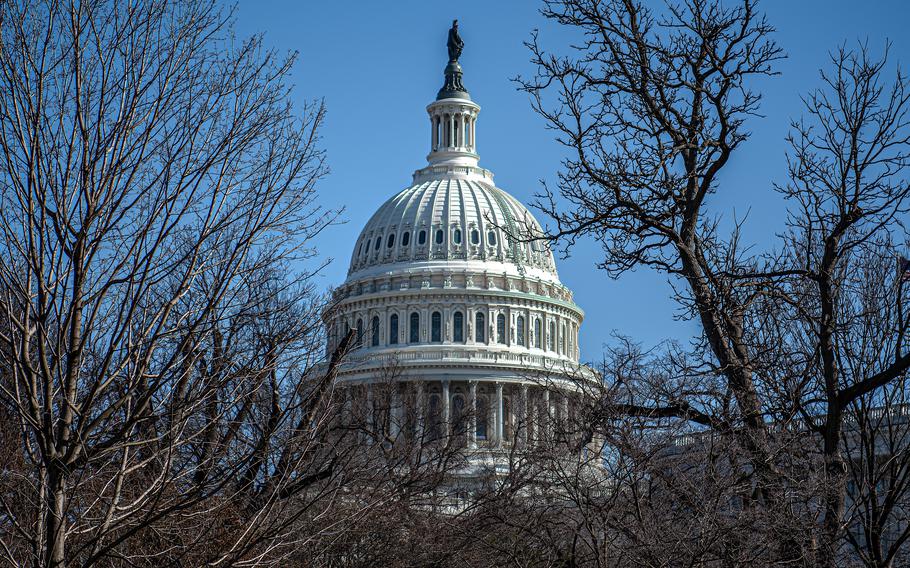
The U.S. Capitol building is seen Feb. 29, 2024, in Washington, D.C. (Carlos Bongioanni/Stars and Stripes)
A dispute over border security funding threatens to force a shutdown of vast swaths of the federal government in less than a week, as Congress and the White House struggled Sunday to reach a deal on long-term spending legislation.
Funding for roughly 70 percent of the federal government — including the departments of Defense, State and Homeland Security as well as the IRS and Transportation Security Administration — will expire Saturday just after midnight unless Congress acts before then.
A prolonged shutdown could have cascading effects on the government and economy. Two-thirds of IRS employees would face furloughs at the height of tax filing season. The roughly 1.3 million active-duty U.S. military service members would remain on the job without pay. So would airport security officers, many of whom called in sick in protest during a previous shutdown, sparking nationwide travel delays.
As recently as Friday, congressional negotiators were nearing an agreement to complete a spending bill for all those agencies, with the goal of voting on it as soon as Thursday. (Congress has already passed separate legislation funding the other 30 percent of the government.) But disagreements over immigration at the U.S.-Mexico border — an issue that has derailed legislation throughout this Congress and emerged as a key fault line between the parties in the November elections — stymied the talks, according to multiple people involved in the conversations, who spoke on the condition of anonymity to discuss private negotiations.
Amid rising tension, negotiators for House Speaker Mike Johnson, R-La., over the weekend appealed to the White House — rather than congressional Democrats — to engage in spending talks, revealing the fraught nature of the conversations. The two sides had expected to release text of the bills Sunday afternoon, but as large divisions persisted, that looked very unlikely, said a person with knowledge of the talks.
GOP negotiators were prepared to offer the Department of Homeland Security roughly the same level of funding for the rest of the 2024 fiscal year, which ends Sept. 30, as the department received in fiscal 2023, plus some extra money for immigration enforcement, multiple people said. But due to inflation, that would represent a significant funding cut in real terms.
The White House rejected that proposal, the people said, saying even that amount of money would put the department at a dangerous shortfall.
“Republicans have always said we will provide all the resources necessary for enforcement, but not a blank check to simply ‘manage’ people into the country and bail out sanctuary cities,” a senior GOP aide said Sunday. “… House Republicans have repeatedly urged the White House for weeks to engage with congressional Democrats to help address the seriousness of the situation to little avail.”
The talks that continued Sunday afternoon, according to three people with knowledge of the situation, focused on where appropriators hoped to direct funding for border security: The White House wanted to preserve funding for detention facilities to house unauthorized migrants, while congressional Republicans were looking to send more money to Border Patrol agents to prevent migrants from crossing into the United States, possibly by shifting funds from detention to border enforcement.
One administration official characterized the negotiations Sunday afternoon as an effort to prevent “chaos” at the border, which could ensue if Congress moves funding between different border security programs.
White House representatives did not immediately respond to requests for comment.
U.S. Immigration and Customs Enforcement, part of the Department of Homeland Security, is already running short of money even under its current budget. Last month, it drafted plans to release thousands of immigrants and slash its capacity to hold detainees as it faced rapidly dwindling funding. More hospitable weather in the spring and summer could draw more border crossings, officials say, straining the agency’s finances even further.
Border issues have complicated other funding measures, as well. President Biden, Johnson and Senate Majority Leader Charles E. Schumer, D-N.Y., also remain at an impasse in conversations about U.S. spending to support Ukraine, talks that have gone awry over attempts to link the money to border security.
A bipartisan group of senators - led by Sens. James Lankford (R-Okla.), Chris Murphy, D-Conn., and Kyrsten Sinema, I-Ariz. — released a proposal in February to tighten security at the border and overhaul some asylum processes in exchange for tens of billions of dollars in emergency assistance for Ukraine, Israel and other national security priorities. Biden voiced loud support for the package; Republicans rejected it at the urging of former president Donald Trump.
But even afterward, lawmakers said the politics of funding Homeland Security were so difficult that appropriators would probably have to resort to a long-term stopgap spending measure, known as a continuing resolution, or CR, rather than the preferred year-long financing bill.
That approach may upset GOP hard-liners, who want to use the appropriations process to extract immigration policy concessions from Democrats. But House Republican leaders have sought to quell their worries by arguing that they could address concrete changes to border policy in April. That’s when Johnson has signaled plans to take up supplemental national security funding legislation.
Nick Miroff and Marianna Sotomayor contributed to this report.